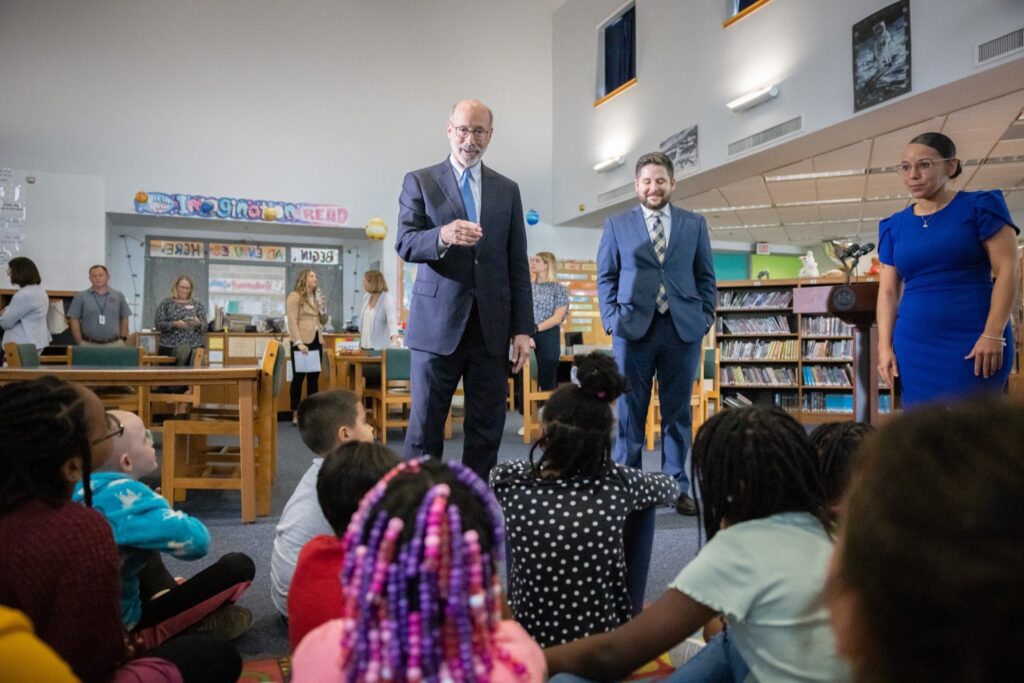Each September during Hunger Action Month, food banks affiliated with Feeding America make a concerted effort to call attention to food insecurity around the country.
Lancaster County is part of the Central Pennsylvania Food Bank’s 27-county service area. This month, the food bank and its more than 1,300 partner agencies, including 164 in Lancaster County, held many public events and participated in several high-profile announcements.
Pa. expands SNAP eligibility
Last week, Department of Human Services Executive Deputy Secretary Andrew Barnes and Bureau of Food Assistance Director Caryn Long Earl visited Lancaster Central Market to announce updates to the Supplemental Nutrition Assistance Program (SNAP), formerly known as food stamps, expanding eligibility for Pennsylvanians in need of food assistance.
They were joined by Vanessa Philbert, President and CEO of Community Action Partnership of Lancaster County, a Hunger-Free Lancaster partner.
The new SNAP rules increase income threshold for all applicants to 200% of the federal poverty level. The change makes an additional 20,000 Lancastrians eligible for SNAP benefits. On average, they will receive $63 a month.
Programs like SNAP and the state and county’s network of food banks and food pantries help working adults, people with disabilities, older adults and children access food so they do not have to choose between paying for a doctor’s appointment or being able to eat dinner.
Inadequate food and nutritional deficiencies have profound effects on a person’s life and health, including increased risks for chronic diseases, higher chances of hospitalization, poorer overall health, and increased health care costs.
SNAP helps more than 1.8 million Pennsylvanians, including about 53,500 Lancaster County residents (before the expansion announced last week), by providing money for groceries each month, helping households have resources to purchase enough food to avoid going hungry.
SNAP is our country’s most important and most impactful anti-hunger program. For every meal provided by a Feeding Pennsylvania food bank, SNAP provides nine.

Universal school breakfast
Another important Hunger Action Month announcement came on Sept. 9 when Gov. Tom Wolf announced a $21.5 million initiative to provide universal school breakfast in the 2022-23 school year.
Statewide, about 1.7 million public school students, including over 800,000 who were not previously eligible for free breakfast, may now receive breakfasts at no charge beginning Oct. 1.
In Lancaster County, about 38,000 public school students are newly eligible for free breakfast under Gov. Wolf’s plan, on top of the nearly 30,000 students already eligible.
This expansion is a huge step forward for the child nutrition programs in Lancaster County schools. Based on 2019 breakfast participation rates and 2022 reimbursement rates, it will bring at least $783,000 in additional financial support to public schools across the county.
The Central Pennsylvania Food Bank is encouraging school districts to consider using the additional revenue to implement alternative breakfast service models that have previously been shown to increase student participation, such as breakfast in the classroom, second-chance breakfast, and breakfast after the bell.
Greater participation in school breakfast first and foremost benefits students, who need nutritious meals to fuel their learning. It will also increase the amount of funding schools receive through reimbursements.
Two weeks after Wolf’s announcement, two Allegheny County Democrats, state Sen. Lindsey Williams and Rep. Emily Kinkead, proposed legislation to create a permanent universal free breakfast and lunch program.
It calls for $275 million from the state budget to support the Universal School Meal Fund, which aims to combat child hunger and foster academic success by providing consistent access to healthy meals without stress or stigma.
The Capitol All-Stars Game 2022

Representing Lancaster County last week in the sixth annual Capitol All-Stars Softball Game 2022 were Speaker of the House Bryan Cutler, state Sens. Scott Martin and Ryan Aument and state Rep. Mike Sturla.
The game, a project of The Foundation for Enhancing Communities, is a favorite Hunger Action Month event: A bipartisan, bicameral softball game played at FNB Field on Harrisburg’s City Island.
It has raised more than $350,000 to benefit two statewide food security organizations, Feeding Pennsylvania and Hunger-Free Pennsylvania.
Sen. Martin’s team, the Youse, won in a hard-fought contest 15-13 over the Yinz, which was captained by Speaker Cutler. You can watch the game here on the Pennsylvania Cable Network’s website.
White House Conference on Hunger, Nutrition, and Health
The voices of neighbors who have felt the impact of food insecurity firsthand are helping fuel a national effort to ultimately end hunger in America.
The Central Pennsylvania Food Bank asked our neighbors about their experience with hunger and food assistance to share with the Biden administration in preparation for the White House Conference on Hunger, Nutrition, and Health, which took place on Wednesday.
Input gained through listening sessions and surveys, and primary electronic client intake forms, coupled with an analysis of the American Community Survey data for our service territory was shared with Feeding America and the White House.
The research revealed a few main themes. The themes and proposed policy solutions reflect the importance of choice, empowerment, and autonomy.
The White House conference is the first event of its kind in more than 50 years. It is hoped that it will catalyze the public and private sectors around a coordinated strategy to end hunger, improve nutrition and physical activity, and close the disparities surrounding them.
(Editor’s Note: Zach Zook, senior policy research manager at the Central Pennsylvania Food Bank, contributed to this article.)






